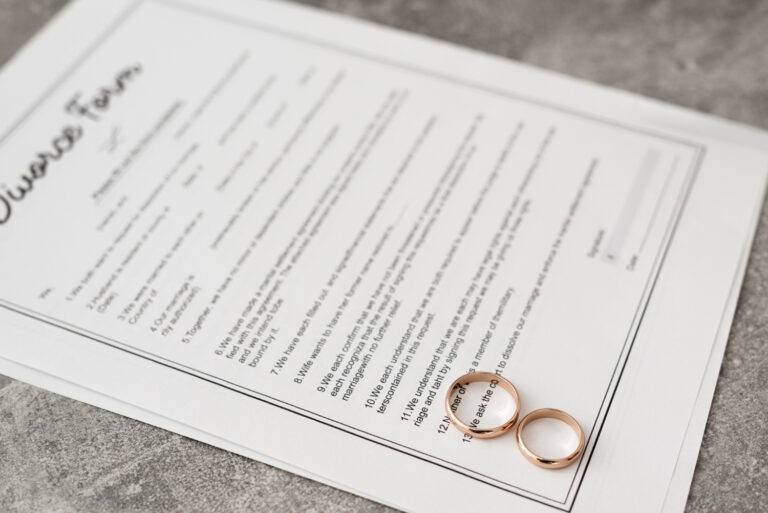Invalidity of Divorce Decree: Key Factors
Divorce decrees are supposed to bring closure, but what if yours isn’t valid? At BruegelPC, we’ve seen it all. There are several pitfalls that can make a divorce decree invalid, leading to unimaginable complications. Let me walk you through the reasons and help you ensure your decree stands strong.
On the authority of legal guidelines, a divorce decree can be invalid if the court lacked jurisdiction, if there was fraud involved, or if critical procedural steps were missed.
Common Reasons for Invalid Divorce Decrees
Invalid divorce decrees often result from unmet residency requirements, procedural errors, or submitting false information to the court.
It seems that, a divorce decree can be declared invalid for several reasons. One common reason is if the court does not have the right to handle the case, meaning it can’t legally grant a divorce. Another reason is if one spouse didn’t properly deliver the divorce papers to the other, so they weren’t informed or didn’t agree. If the divorce agreement doesn’t follow the laws of the state, it might not be valid either.
To cut a long story short, giving wrong information during the divorce process can also make the decree invalid. Issues with the paperwork submitted to the court can cause problems too. Lastly, if the judge has a conflict of interest or shows bias, the decree might be considered invalid. To avoid these problems, it’s important that everything is done according to the law and all information provided is correct.
Errors in Legal Documentation
Errors in legal documentation frequently occur and can lead to severe repercussions.
To outline briefly mistakes like misspelled names, wrong dates, missing signatures, or false information can often show up in legal documents. It’s important to check these documents carefully before signing to make sure everything is correct. Errors in legal papers can cause arguments, delays, or even legal trouble.
If you’re unsure about the details in any legal document, it’s a good idea to get help from a legal expert.
In other words, taking the time to review and fix mistakes before you finalize any legal deal is always best. If you don’t check and correct errors, you might face expensive and time-wasting problems later on. To avoid mistakes, pay close attention to details, double-check everything, and ask for help when you need it. Being extra careful with legal matters is always a smart move.
Fraud or Misrepresentation in Divorce
Faulty financial disclosures can lead to a divorce settlement being overturned due to fraud or misrepresentation.
When it comes down to it, hiding money, giving false info about finances, or lying about child custody are all illegal and unethical actions during a divorce. Both spouses need to be honest and share all necessary information to ensure the divorce is fair. If there’s a suspicion of lying or hiding information, legal action can be taken to investigate and possibly cancel any agreements made on false grounds.
At the base, staying honest and truthful is very important to avoid legal trouble. If dishonesty is found after the divorce is finalized, the agreed terms might be changed. In short, honesty and integrity are key to making the divorce process fair for everyone involved.
Lack of Jurisdiction
A court or legal authority encounters lack of jurisdiction when it lacks the legal power to preside over a specific case or issue a ruling.
You know, this can happen for several reasons, such as the court being in the wrong location, the court not being allowed to handle that kind of case, or the court not having the authority over the people involved.
If a court doesn’t have jurisdiction over a case, it means it can’t legally hear or decide the case. This can cause big problems because any decision the court makes without the right jurisdiction is invalid and can’t be enforced.”
Come to think of it, to figure out if a court has jurisdiction over a case, you need to look at the specific laws and rules that govern that court. If a court finds out it doesn’t have jurisdiction, it might dismiss the case or send it to the right court that does.
It’s important for people involved in a legal dispute to understand what jurisdiction means and make sure the court handling their case has the authority to do so. Ignoring jurisdiction issues can waste time, money, and resources, and lead to legal problems later on.

Failure to Serve Proper Notice
Failure to serve proper notice can lead to legal consequences, including the invalidation of actions taken based on that faulty notice.
In short, it’s important to give proper notice to keep everyone informed and allow them to respond or take action. If proper notice isn’t given, it can cause misunderstandings, arguments, and even expensive legal issues. To avoid this, you should follow the specific rules set out in the relevant laws or agreements.
At its heart, not giving proper notice can sometimes break a contract or legal duty. Pay close attention to notice requirements and get legal advice if you’re unsure about how to do it right. Giving proper notice is key to being transparent, fair, and following the law in things like contracts, leases, job agreements, and other legal matters.
The Takeaway
A divorce decree can be deemed invalid if it does not meet the legal requirements set by the court, such as lack of jurisdiction, failure to properly serve the other party, or fraudulent information provided.
What Law Office Of Brian Kelly is showing the advantages of is, it is important to ensure all necessary steps are followed and that both parties fully understand and agree to the terms of the divorce decree to avoid any issues of invalidity.







